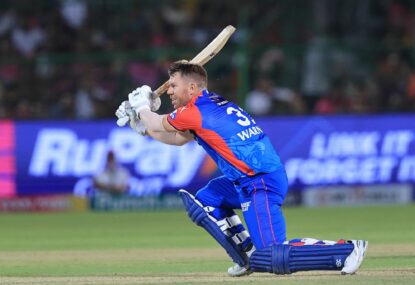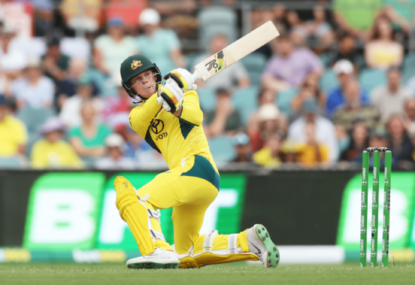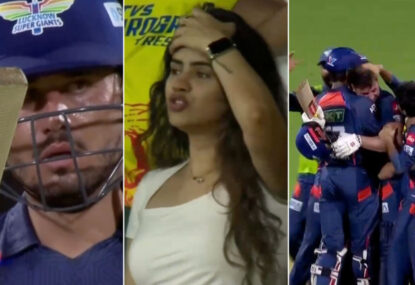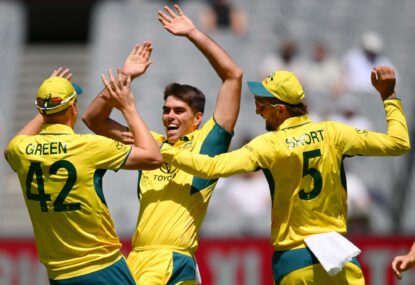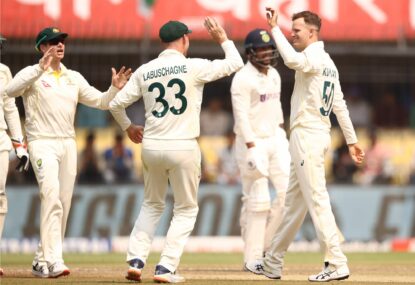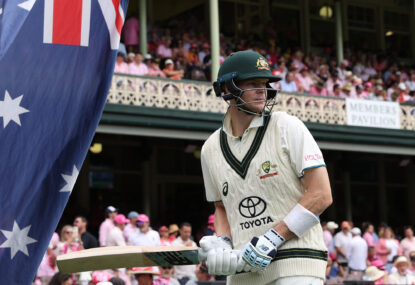England and India have deservedly made it to the final of the 14th edition of the ICC Under-19 World Cup, to be played at the Sir Vivian Richards Stadium in Antigua on February 5.
This will be India’s seventh appearance in the final (their fourth in succession), and they will be gunning for a fifth title to further cement their successful record at the tournament.
On the other hand, England will play the final only for the second time, having emerged victors in 1998.
It remains to be seen who the star of the final becomes this time – will it be Indian skipper Yash Dhull, who is fresh off a match-winning 110 in the semi-final against Australia? Or will it be his opposite number Tom Prest, who has so far logged 292 runs in the tournament?
While we ponder over the outcome, let us look back at the young men who have shined in past under-19 World Cup finals, and where their careers headed thereafter.
Brett Williams (1988)
Opener Brett Williams steered the hosts to victory at the Adelaide Oval in the inaugural edition, then known as the Youth World Cup.
After Pakistan were limited to 201 thanks to the pace duo of Wayne Holdsworth (3-38) and captain Geoff Parker (3-36), Williams stamped his authority on the game, scoring a well-timed 108 from 134 balls, with seven fours and two sixes.
His second-wicket association worth 97 with Stuart Law paved the way for Australia’s five-wicket win.
Williams finished as the tournament’s highest run-getter, tallying 471 at 52.33 with two hundreds and three 50s.
However, he could not realise his potential, and failed to secure a long run with South Australia on the domestic circuit.
He ended up playing only four first-class matches and three List A matches, the last of which came in 1989-90.
Stephen Peters (1998)
The tournament returned after a ten-year hiatus, now christened as the under-19 World Cup. The final in Johannesburg saw New Zealand post a competitive 6-241.
The innings revived by James Franklin (56*) and Peter McGlashan (53*) in the lower middle order.
England had the ideal start in reply, as openers Stephen Peters and Robert Key put on 100 in 20 overs. Peters was the dominant partner, and he went on to score a match-winning 107 from 125 balls with 12 fours.
Peters and Owais Shah (54*) shared 89 for the third wicket, which put the game in England’s bag. A seven-wicket win was duly sealed with four overs to spare.
Peters had made his first-class debut for Essex in 1996, scoring 110 against Cambridge University.
He later plied his trade for Worcestershire (2002-05) and Northamptonshire (2006-15), and despite improved consistency later in his career, was never in the reckoning for a national call-up.
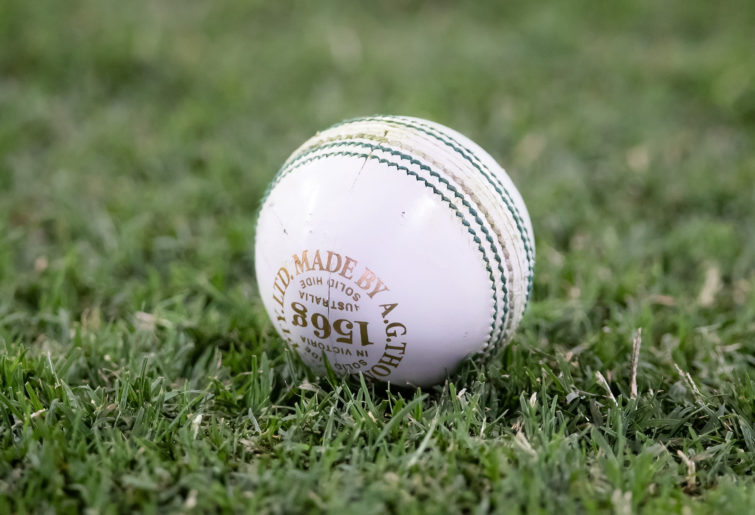
(Photo by Speed Media/Icon Sportswire via Getty Images)
Reetinder Singh Sodhi (2000)
Led by future senior team regular Mohammad Kaif, India comprehensively beat Sri Lanka at Colombo’s Sinhalese Sports Club to win their first title.
Left-arm pacer Shalabh Srivastava took 3-33 to help bowl the hosts out for 178, but the man of the match honour went to all-rounder Reetinder Singh Sodhi.
After an economical spell of 0-26 in his ten overs, Sodhi, who came in at a tricky 3-94, struck a breezy, unbeaten 39 in 43 balls to take India home by six wickets.
Within a year of the final, Sodhi made his international debut in an ODI against Zimbabwe at Cuttack. He could not cash in on the gaping all-rounder’s vacancy in the Indian line-up though, and had ordinary returns with bat and ball in a short 18-match career.
He was only 16 when he made his first-class debut for Punjab in 1996-97, on the back of a fine all-round performance as captain in the under-15 World Cup final against Pakistan at Lord’s a few months earlier.
Aaron Bird (2002)
New South Wales paceman Aaron Bird finished the 2002 edition in New Zealand with the second most number of wickets – 15 at 14.33 – and reserved his best of 4-47 for the final against South Africa in Lincoln.
Bird removed Chad Baxter and Stephen Cook within the first ten overs, before coming back to add two more scalps at the death.
His spell limited Australia’s target to 207, which was achieved for the loss of three wickets, thanks to opener Jarrad Burke (100*).
Bird made his first-class debut in the 2005-06 season, showing reasonable promise. However, the following year saw him reported for a suspect action, something that would dog him until the end of his career in 2009-10, by which time he had played only six first-class matches.
He found the shorter formats more to his liking, collecting 34 wickets in 25 List A games and 21 wickets in 12 T20s.
Asif Iqbal (2004)
Middle-order batsman Asif Iqbal played a pivotal role in the first of Pakistan’s two back-to-back under-19 World Cup triumphs, against the West Indies at the Bangabandhu National Stadium in Dhaka.
Pakistan were in trouble at 4-81, before Iqbal, batting at number five, complied a controlled 54 from 72 balls, with three fours and a six. He shared in a fifth-wicket stand of 97 with Sulaman Qadir, thus enabling his side to reach 9-230.
An impressive showing by the slow bowlers, led by off spinner Tariq Mahmood (3-34), coupled with a quality fielding display, ensured a 25-run win for Pakistan.
Having made his first-class debut in 2000-01, Iqbal represented Bahawalpur throughout his seven-year career, appearing in 35 first-class matches and 27 List A matches.
Anwar Ali (2006)
Defending champions Pakistan seemed down for the count at the halfway stage of the final at the R. Premadasa Stadium in Colombo, having been skittled out for 109 by India’s spin twins Piyush Chawla (4-8) and Ravindra Jadeja (3-17).
What ensued was one of the most bizarre starts to an innings, courtesy of a brilliant exhibition of swing bowling from fast bowler Anwar Ali. Anwar struck thrice in his first over to dismantle the Indian top order in a matter of minutes.
A mere 20 balls into the innings, the score read a scarcely believable 6-9, which later became 7-23. Five of these seven fell to Anwar, who finished with 5-35 as India were shot out for 71.
Anwar made his T20I debut in 2008-09, but had to wait for five more years before his ODI debut, against South Africa.
His numbers in 22 ODIs thus far do not make for pretty reading – his 18 wickets have come at 52.44 each, and he has not played for Pakistan since 2015-16.
Ajitesh Argal (2008)
India’s unbeaten run leading to the final included a facile six-wicket win over South Africa, their opponents in the summit clash in Kuala Lumpur.
The South African pace attack combined to roll over India for a modest 159, with only Tanmay Srivastava (46) showing substance.
Faced with a rain-revised target of 116 from 25 overs, South Africa’s top order came a cropper against medium pacer Ajitesh Argal, who gave India a fantastic start by taking two quick wickets.
Argal removed Pieter Malan in his second over and Rilee Rossouw in his third to reduce South Africa to 2-6.
His fine spell of 2-7 in five overs dented the chase as South Africa, who further fell to 4-22, failed to recover and ended at 8-103.
Argal was bought by Kings XI Punjab for the inaugural edition of the IPL but did not play in any games. He made his first-class debut for Baroda later in the year. The last of the handful of domestic matches he played came in 2015-16.
Josh Hazlewood (2010)
Australia became the first team to win three under-19 World Cup titles, beating Pakistan by 25 runs in a gripping contest in Lincoln.
After slipping to 3-23 and then 5-82, Australia recovered to gather a challenging total of 9-207.
Fast bowler Josh Hazlewood, who had shown what he was capable of with 4-26 in the semi-final against Sri Lanka, rose to the occasion again by striking at critical junctures. He began by getting rid of Ahsan Ali in his third over, and did not look back.
With the game on a knife’s edge at 4-110, Hazlewood dismissed Hammad Azam to turn the tide towards Australia.
He added two more to his kitty, fittingly ending the innings in the 47th over to return with 4-30 and finish the tournament with 13 wickets.
He made his ODI debut in England a few months later, and though he first played first-class cricket in 2008-09, his first Test came only in 2014-15.
Since then, he has firmly established himself as a key member in all formats.
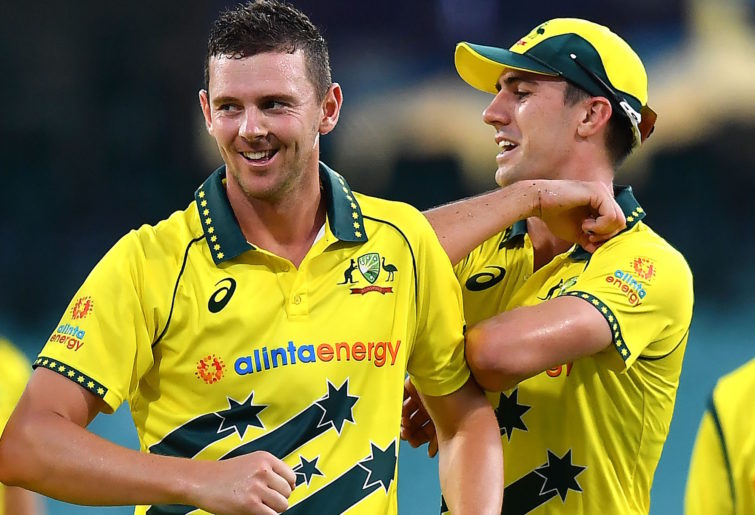
(Photo by SAEED KHAN/AFP via Getty Images)
Unmukt Chand (2012)
India’s third title win was special, as it came against the defending champions in their own backyard, at the Tony Ireland Stadium in Townsville.
Sandeep Sharma (4-54) was the pick of the bowlers as Australia were restricted to 8-225, captain William Bosisto scoring 87*.
India stumbled in reply, and the game was wide open at 4-97 in the 25th over. Thankfully for India, opener and captain Unmukt Chand was still there in the middle, and all he needed was a partner.
Chand found support from wicketkeeper Smit Patel (62*), and the duo put the bowling attack to the sword with an unbroken partnership of 130 that stitched India’s six-wicket win with 14 balls to spare.
Chand played a composed captain’s innings of 111* from 130 balls, with seven fours and six sixes.
Following a decade-long domestic career in India, he shifted base to play league cricket in the USA in 2021. He is currently playing for the Melbourne Renegades in the BBL.
Corbin Bosch (2014)
South Africa’s maiden under-19 success, in Dubai, was primarily made possible by an excellent haul of 4-15 from fast bowler Corbin Bosch, son of Tertius Bosch, who played in South Africa’s first Test after readmission in 1991-92.
In his third over, Bosch took two wickets in three balls to leave Pakistan teetering at 4-46. His third wicket further sent Pakistan into the abyss, reducing them to a desperate 6-60, while his fourth terminated the innings at 131 in the 45th over.
The South African batsmen showed patience and achieved the target in the 43rd over to win by six wickets.
Bosch’s first-class debut came for the Titans in the 2017-18 season, three years after his domestic T20 debut for the same team. He has also played for Northerns in the provincial three-day first-class and List A competitions.
Keacy Carty (2016)
The 2016 edition saw another first-time winner, as the West Indies upstaged favourites India in the final in Dhaka.
India were in dire straits at 5-50, before Sarfaraz Khan (51) took the total to 145. Pacemen Alzarri Joseph (3-39) and Ryan John (3-38) were the wreckers in chief.
The Windies stumbled to 2-28 in reply, at which point came in Sint Maarten-born Keacy Carty. Even as the score fell to a wobbly 5-77 after 29 overs, Carty kept his cool.
In the company of Keemo Paul (40*), Carty maturely guided the tense chase, remaining unbeaten on 52 from 125 balls with two fours. The pair shared an unbroken 69 for the sixth wicket to see the Windies cross the finishing line with three balls left.
Carty was rewarded with his first-class debut for the Leeward Islands 12 days after the final. In 2016-17, he recorded his maiden first-class hundred – a fighting 103 in a losing cause against the Windward Islands.
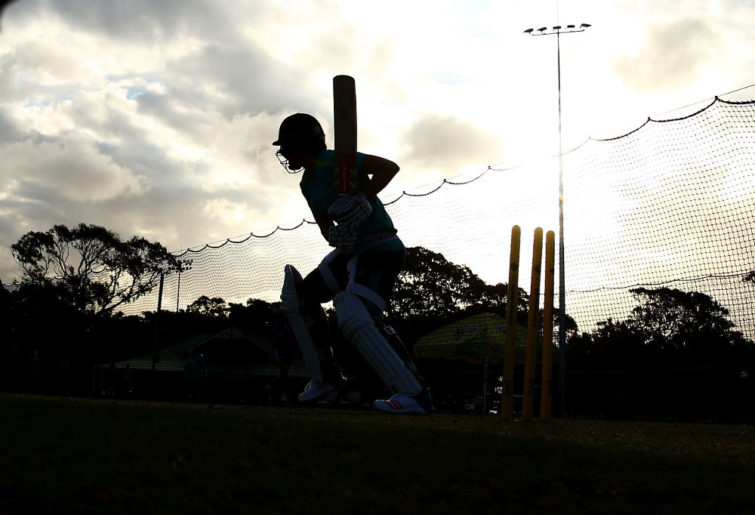
(Mark Kolbe/Getty Images)
Manjot Kalra (2018)
In what was a rematch of the 2012 final, India produced a dominating performance to clinch a record fourth title.
A disciplined bowling display limited Australia to 216, after which Kalra and captain Prithvi Shaw shared in a brisk opening stand of 71.
Kalra further added 60 for the second wicket with Shubman Gill and an unbroken 89 with Harvik Desai. He remained unbeaten on 101 from 102 balls with eight fours and three sixes, as India won by eight wickets in the 39th over.
In 2018-19, the left-handed Kalra made two T20 appearances for Delhi in the Syed Mushtaq Ali Trophy. In early 2020, he was handed a one-year ban for age fraud.
He made a comeback to domestic cricket with his List A debut was in the 2020-21 Vijay Hazare Trophy.
Akbar Ali (2020)
Defending champions and favourites India met their match in the form of a spirited Bangladesh, who secured their maiden title after an exciting three-wicket win in Potchefstroom.
Yashasvi Jaiswal (88) anchored the Indian innings, but the Bangladeshi seamers, backed by sharp field work, triggered a collapse from 3-156 to 177 all out.
Chasing a rain-reduced 170 from 46 overs, Bangladesh had a meltdown of their own, as they slipped from 0-50 to a worrisome 6-102.
Wicketkeeper-captain Akbar Ali, who had come in at 5-85, was joined by opener Parvez Hossain, who had retired hurt at 2-62.
The duo calmed nerves by adding 41 for the seventh wicket, before the latter was out for 47. Akbar stayed until the end though, leading from the front with an unbeaten 43 from 77 balls.
He had made his limited-overs domestic debuts in 2018-19, while his first-class debut was for Bangladesh Emerging against the visiting Ireland A in 2020-21.

































































































